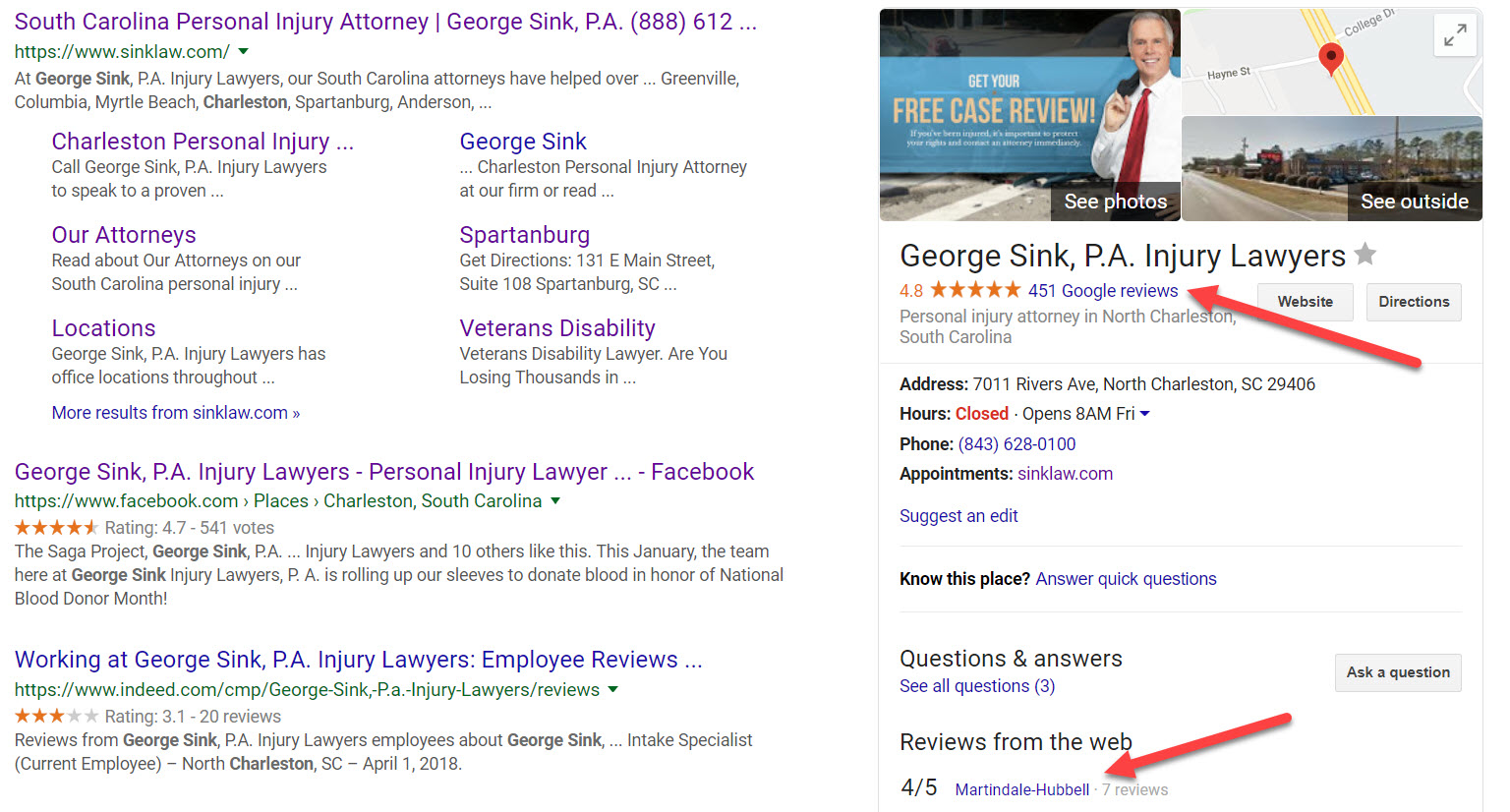As someone who does digital marketing for attorneys, one of the more competitive industries on the web, you must always remain one step ahead of the competition.
Keeping a law firm’s site at the top of the SERPs is more complicated than it was even a few years ago, but putting some time and effort into your online presence is key to improving your client’s online visibility and, in turn, getting a steady stream of potential clients to keep their revenue flowing in.
From social media to blogging, creating citations to building backlinks, it can seem overwhelming deciding where to focus your time and resources for the best results.
The good news is you don’t have to do everything to see the benefits. Focusing in on the strategies that are going to be most relevant to the legal niche and pack the biggest punch will keep you from biting off more than you can chew, stretching yourself too thin.
Here are four important digital marketing strategies to help your client’s website climb the SERPs and attract new cases.
1. Reach out for Reviews
In the legal field, reviews are essential.
A 2015 study conducted by Moz showed that 67 percent of consumers are influenced by online reviews. This is especially important in the legal field, where your reputation easily can make or break the success of your client’s firm.
When a potential prospect begins searching for a lawyer, they’re in an hour of intense need.
Whether their spouse just served them with divorce papers or they were arrested for drunk driving, the reviews they read about your client’s firm helps allay any fears they may have in reaching out for a consultation.
The more reviews your client has from real clients they’ve helped, the easier it is for potential clients to picture them helping them with their problems.
Don’t throw all your review eggs into one basket; seek to get reviews to post on:
- Your client’s website.
- Their firm’s Google profile.
- Their firm’s Facebook profile.
- Any law-specific websites (such as Avvo or Martindale-Hubbell) for the most coverage.
In this example, we can see that George Sink, P.A. Injury Lawyers, in South Carolina, has 451 Google reviews (wow!) and their Google My Business Listing is also showing their Martindale-Hubbel 4/5 Rating.
This creates instant credibility for someone looking for an attorney.

How to Get Reviews from Clients
Getting reviews isn’t something you can sit back and trust people will do. You have to actively have a review-requesting plan in place, and train their staff – from managing partners down to their receptionists – in the best ways to ask satisfied clients for reviews.
Here are a few suggestions:
In Case-Closing Letters
Do your clients send a final letter to their clients with their settlement checks or copies of final judgment documents? Include specific instructions on how to leave their firm a review within these letters.
If your client sends copies of these letters via email, include direct links to their review profiles to make it easy.
In Text
Part of the problem with getting clients to leave reviews is them knowing how to. Remove those barriers by texting a link to their business’s Google profile. Here’s how.
In Person
The most powerful way to ask for a review is in person where your client can say, “I appreciated working with you. It would really help more people who need my help find me if you would leave a review online.”
Follow up this conversation with a texted link.
2. Optimize The Website
A sub-par, slow website isn’t going to cut it. And if your client’s website looks terrible on mobile and can’t easily be navigated?
Forget it.
While having a great-looking, well-designed website is important to help your client convert traffic into leads, making sure you are following best practices with all of the technical on-page elements is even more important.
If prospects can’t easily use the website, due to errors, they can’t quickly determine if your client is able to help them with their specific problem, and then they won’t call for that first consultation.
Not only that, but if the site isn’t mobile-friendly and it doesn’t load quickly, it could impact the traffic the website receives and the number of visitors that convert into clients.
If you do nothing else on your client’s website, be sure to check and fix these things:
Make the Site Mobile-Friendly
Mobile-first indexing is here, and Google has said it will become the standard for all websites in the near future.
If the site isn’t responsive on different browsers and different devices, it could impact how the site is ranked in the SERPs and how much traffic you receive.
Not only that, but a large number of visitors use their mobile devices to search for attorneys and, if the website doesn’t clearly state who they are and how they can help them so it’s readable on their phone, they’re going to go with someone else.
Make Sure the Site Is Fast
Those plugins may look pretty on your website, but if they severely slow down load time, ditch them.
Google itself has shown that more than half of mobile users leave a page that takes more than three seconds to load. Anything you can do to get the site’s load time faster is going to be better for traffic.
Some ways to improve site speed include:
- Compress file sizes
- Make JavaScript load last
- Shrink images
- Improve server response time
Make It ADA-Compliant
Clients come in all shapes and sizes, and with all manner of needs. Don’t cut yourself out of the running by making your client’s website inaccessible to someone with a disability.
Not only that, but your client could be sued if their website isn’t ADA-compliant.
Some tips for making sure the site is accessible include:
- Make sure all images have alt tags and descriptions.
- Make online forms accessible by voice command.
- Provide text-based versions of all documents.
3. Create Exceptional Content
As a lawyer, you client makes a living out of providing advice.
Why shouldn’t their website do the same?
Using content, both blog posts and the core pages on their website, to make their site a go-to resource for information on their area of practice can do nothing but benefit their firm.
People searching for information on the laws in their state, or links to the local courthouse, for example, could find their website if you create helpful pages with this information.
Or, someone asking “What happens to my license if I get a DUI?” or “Will losing my job impact my child support?” in a search engine may land on their blog posts about those very topics.
You want the website to serve as a helpful resource while making your client appear as the subject matter expert.
Be sure to include a disclaimer that the information on the website is not considered legal advice for liability purposes.
Blog Posts
Your client’s blog is where they can provide exceptional value to their potential clients, as well as offering an opportunity to sing the praises of the members of their firm.
Did one of their associates receive recognition from the local bar association? Post about it on their blog.
In addition, create helpful, relevant blog posts that offer practical advice (e.g., whether to start dating during a divorce or how to stay safe on a motorcycle) to capture people looking for information on these exact topics.
Keep a list of frequently asked questions that your client gets from their clients to answer in blog posts, as well, because if people are asking you these questions, they’re likely also asking Google these questions.
Aim for two to three blog posts per month at first, as you start to see targeted traffic, increased phone calls and leads, then see if the client would be willing to increase their content budget and bump that number up to once or twice per week.
Internal Website Pages
Great content isn’t relegated to the blog, though. Core website pages need to be full of SEO-friendly, optimized, relevant content to help the site rank well.
Pages about your client’s firm, as well as all the varying services they provide to clients, are the bare minimum they should have.
When you’re writing, don’t stuff keywords in because you know you need them for the search engines.
Write naturally and talk about how their firm can help solve potential client’s problems, and the keywords will take care of themselves.
If you’ve client has a larger budget, consider creating deeper-level pages that will also bring in search traffic and prove helpful.
For criminal attorneys, an explanation of the laws of their state with examples of potential penalties are helpful.
Divorce attorneys can create pages that link to their main page on divorce discussing child support, child custody, and division of assets.
These pages show the search engines you know what you’re talking about, improving their overall authority in the community and with search engines.
4. Get High-Quality Links
Whenever another website links to your client’s site, it tells search engines that your website provides valuable, relevant content to users, and it can help improve search rankings.
That being said, there are a lot of spammy, bad links out there, and you want to avoid these at all costs.
Creating good links isn’t an easy or quick task. It requires building relationships, outreach, follow-up and in some cases requires some monetary investment (in the case of some membership-only databases).
But getting the right links can be worth all the effort.
Local News Sites
The news is ripe for opportunities for an interview with a knowledgeable, experienced attorney.
- Are the laws on texting while driving in your client’s state changing?
- Is there a big celebrity divorce and argument over child custody in the news?
- Did someone in their community get arrested for embezzling money?
Have someone create a press release referencing the news event and include quotes from one of their attorneys about the situation, then send it out to local newspapers, websites, and news stations. Be sure to include contact information should a reporter have further questions.
The press release may be quoted and the website linked to without anyone reaching out for more information. However, you may just get an email or phone call from a reporter seeking a longer interview, which can be great press for your client.
Industry-Specific Directories
The legal community is full of reputable professional directories, and leveraging these to get your client listed is a great way to boost trust and improve your backlink profile.
Some common directories to be sure to create profiles on include:
On most of these, not only can your client create a profile with a link back to their website, but all individual attorneys in their firm can create profiles.
Some require an annual membership, but the high-authority backlinks, visibility in SERPs, and integration of both client and peer attorney reviews makes most of this cost well worth it to many firms.
Conclusion
Your client’s website is one of their biggest assets.
It brings in new leads, showcases their capabilities, and gives them an opportunity to build credibility within their field. Figuring out exactly what their online presence needs to gain ground with the search engines can be difficult but rewarding for all.
Employing the four strategies outlined above will maximize the impact of the time you spend on your client’s digital marketing strategy.
More Resources:
- Why Content Marketing for Law Firms Doesn’t Have to Be Boring
- Law Firm SEO: 5 Things You Can Do to Start Seeing Traffic & Results
- 7 Signs Your Law Firm May Need a New SEO Partner
Image Credits
Featured Image: Shutterstock, modified by author, January 2019
All screenshots taken by author, January 2019





![AI Overviews: We Reverse-Engineered Them So You Don't Have To [+ What You Need To Do Next]](https://www.searchenginejournal.com/wp-content/uploads/2025/04/sidebar1x-455.png)